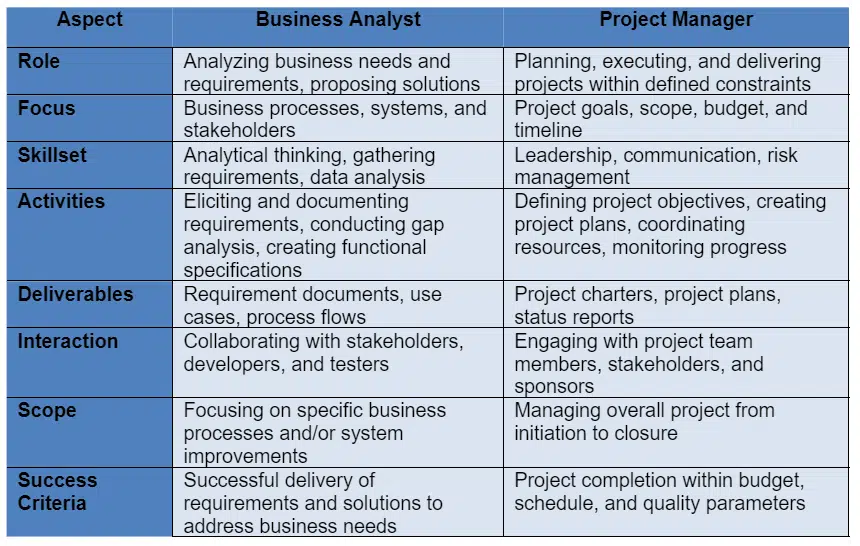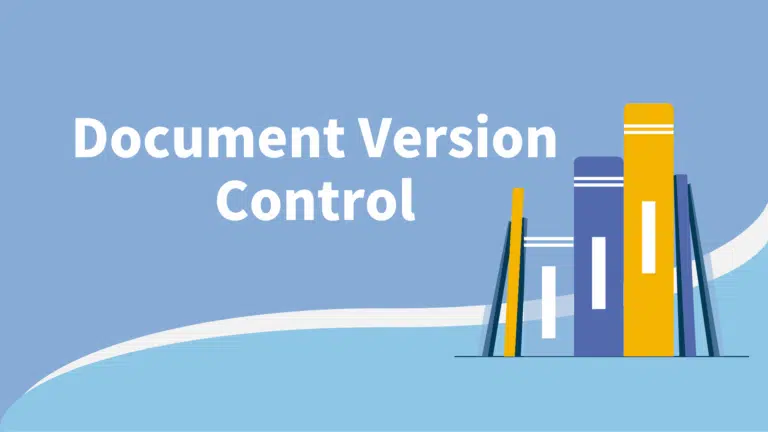Business Analysts (BA) assess the organization’s performance and provide suggestions to improve the performance of processes and systems. Project Managers (PM) are responsible for managing and completing projects.
Business Analysts and Project Managers are the keys to success for any organization. Both have different yet significant roles.
Many professionals who want to work in project management often confuse the roles of Project Managers and Business Analysts in various projects because of their overlapping duties and responsibilities.
In today’s blog post, we will discuss Business Analyst Vs Project Manager and how each helps organizations grow.
Business Analyst Vs Project Manager
Businesses employ Business Analysts and Project Managers to optimize performance and growth. Business Analysts help improve the organization’s overall performance, including the projects. Project Managers manage and complete projects successfully.
Business Analyst
Business Analysts assess business performance. They review the business model, processes, and performance and conduct market research to determine the competitors’ performance.
They compare the competitor’s performance with the business, find the weaknesses and gaps in the organization’s performance, and offer a solution to improve the performance.
They guide organizations to improve their processes, products, and service through data analysis.
Business Analysts have business analysis expertise; they view the business from a wider perspective by focusing on the business as a whole instead of merely a project or department. They collaborate with the Project Managers to align the business processes with the project management processes and support the Project Managers in completing the projects.
Project Managers
Project Managers manage and complete the project.
They develop the project management plan, execute it, keep motivating the team, communicate the project progress to the stakeholders, monitor and control the project performance, deliver the project deliverables to project sponsors, and close the project.
Project Managers have expertise in project management and work closely with the project team and external stakeholders (e.g., management, suppliers, clients, etc.) to ensure that the project achieves its objective and all stakeholders are informed on its progress.
Difference Between Business Analysts and Project Managers
Now, we will review the difference between the duties and skills of these two roles.
Responsibilities and Duties
Both career paths have different responsibilities and duties, although overlap can exist between the roles. Knowing the differences between the two can help an organization recruit the right person for the job, or you can select the right career path based on your interests.
Business Analysts
Business Analysts’ main responsibilities are analyzing business processes, identifying areas for improvement, and proposing effective business solutions to enhance operational efficiency and achieve organizational goals.
The following are some of the business analyst’s responsibilities:
- Collecting Requirements: Business Analysts conclude, document, and analyze stakeholders’ requirements (e.g., business users, clients, and project teams). They conduct research to understand business needs and define business and/or project-specific objectives. They collaborate with product owners, project analysts, and scrum masters to understand the client’s end product requirements.
- Process Analysis: They analyze existing business processes, workflows, and systems to identify inefficiencies, bottlenecks, gaps, and areas for improvement. This involves mapping current processes, documenting process flows, and conducting gap analysis.
- Documentation: Business Analysts create detailed documentation, such as business requirements documents (BRDs), functional requirements documents (FRDs), use cases, and user stories. These documents serve as reference points for development teams and ensure the accurate implementation of business needs.
- Designing Solutions: Based on the gathered requirements, Business Analysts design solutions and propose effective strategies, process improvements, technology solutions, etc. They collaborate with architects, developers, and designers to ensure solutions meet business needs.
- Implementing Solutions: After designing the solution, they help implement it to improve the processes and procedures. They help quicken the transition process.
- Data Analysis: Business Analysts analyze data to provide insights and make informed recommendations. They conduct data mapping, modeling, and validation to ensure accuracy and completeness. They also review financial reports, customer feedback, reviews, gains and losses, output rates, and company policies.
- Continuous Improvement: Business Analysts monitor implemented solutions, identify areas for continuous improvement, and recommend process optimizations. They gather feedback from stakeholders and evaluate project success to enhance future initiatives.
Project Manager
Project Managers are responsible for planning, executing, monitoring, controlling, and completing assigned projects within specified constraints (e.g., project timeline, funding limit, and scope). The duties and responsibilities of Project Managers include the following:
- Project Planning: Project Managers are responsible for developing the project plan, including project baselines (e.g., cost, schedule, and scope). They identify project dependencies, scope, risks, assumptions, constraints, etc. They develop all project plans (e.g., quality, risk, procurement, cost, and schedule management, etc.).
- Stakeholder Engagement: Project Managers engage with stakeholders (e.g., project sponsors, clients, team members, etc.). They communicate the project’s status and progress, manage expectations, and keep stakeholders satisfied throughout the project lifecycle.
- Resource Management: Project Managers allocate and manage project resources optimally. This involves identifying required skills, assigning tasks to team members, and ensuring the necessary tools, equipment, and materials are available.
- Leading the Team: Project Managers lead and motivate project teams, fostering a collaborative and high-performing environment. They provide guidance, support, and coaching to team members, thus promoting teamwork and individual growth.
- Communication and Reporting: Project Managers facilitate effective communication between the project team, senior management, and other stakeholders. They provide regular project status updates, prepare progress reports, and conduct meetings to ensure that everyone is informed and in alignment.
- Change Management: Project Managers manage changes to project objectives. They assess change requests, evaluate their impact on the project, and consult with stakeholders to make informed decisions.
- Project Closure: Project Managers are responsible for project closure activities (e.g., conducting post-project reviews, capturing lessons learned, and ensuring documentation and knowledge transfer). They assess project outcomes against initial objectives and obtain sign-off from stakeholders. They are responsible for delivering the final product to the client.
Skills Required
Both positions require different skill sets and competencies. However, some are shared or similar.
Business Analysts
Business Analysts should possess the following skills:
- Analytics: Business Analysts should possess analytical skills to gather and interpret data, identify trends, and make robust and informed recommendations. They should be proficient in data analysis techniques (e.g., modeling, mining, and statistical analysis).
- Business Acumen: Business Analysts must understand business principles and processes. They should understand the organization’s goals, strategies, and industry dynamics to analyze and propose solutions effectively.
- Communication: Business Analysts must have excellent communication skills to interact with stakeholders at various levels. They should listen actively, ask pertinent questions, and clearly articulate complex concepts and findings. Written communication skills are also crucial for creating reports and documentation.
- Problem Solving: Business Analysts often face complex problems that require innovative solutions. They should possess strong problem-solving skills to break down complex issues, identify root causes, and propose viable solutions. Critical thinking and logical reasoning are essential.
- Collaboration and Relationship Building: Business Analysts work with cross-functional teams, subject matter experts, and stakeholders from different departments. Strong collaboration and relationship building is necessary to establish trust, facilitate discussions, and foster cooperation.
- Project Management: Business Analysts are frequently involved in projects; thus, project management is advantageous. They should understand the project lifecycle, planning, and coordination to effectively contribute to its success.
- Domain Knowledge: Depending on the industry or domain in which the Business Analyst operates, a good understanding of the specific industry’s processes, regulations, and terminology is valuable. It helps Business Analysts better understand the business context and requirements.
Project Managers
Project Managers require diverse skills to plan, execute, and deliver projects successfully.
Project Managers should possess the following skills:
- Leadership: Project Managers need strong leadership skills to guide teams, make critical decisions, and drive project success. They should inspire and motivate team members, set clear goals, and provide direction throughout the project lifecycle.
- Communication: Effective communication is essential for Project Managers. They should convey information clearly and concisely, listen actively, and facilitate open and transparent communication amongst team members, stakeholders, and other project stakeholders.
- Organization and Planning: Project Managers must be skilled in organizing and planning project activities. They should develop project plans, create realistic schedules, allocate resources effectively, and manage project budgets.
- Problem Solving: Projects often encounter unexpected challenges and obstacles. Project Managers must have excellent problem-solving skills to identify root causes, think critically, and develop creative solutions. They should make timely decisions and adapt plans when necessary.
- Negotiation: Project Managers must work with limited budgets. They must know how to negotiate the best deals from suppliers and subcontractors while negotiating extra funding from management as needed.
- Conflict Resolution: Project Managers frequently deal with conflicting priorities, stakeholder expectations, and resource constraints. They should possess strong negotiation and conflict-resolution skills to manage these situations effectively. Finding win-win solutions and building consensus amongst all stakeholders is crucial.
- Team Management: Project Managers assemble and manage project teams. They should be adept at building and fostering a collaborative team environment, assigning tasks, and monitoring progress. Strong interpersonal skills are needed to resolve conflicts, provide feedback, and motivate team members.
- Knowledge of Project Management Methodologies: Project Managers should be well-versed in project-management methodologies (e.g., Agile, Waterfall, or Hybrid approaches). Understanding the principles and practices of these methodologies helps Project Managers select the appropriate approach for each project and ensure their successful implementation.
You can see that the most important skills for both professions are communication and negotiation skills.
Salary Difference Between Business Analysts and Project Managers
There is little salary difference between Business Analysts and Project Managers. According to Indeed, the average annual salary for Business Analysts is 77,154 USD, while the average annual salary for Project Managers is 77,633 USD.
This means that Project Managers earn an average of 479 USD more per year than Business Analysts.
Project Managers have higher salaries because they have more experience than Business Analysts. They are often responsible for various tasks (e.g., managing budgets, scheduling projects, and coordinating with various stakeholders).
Despite the marginal difference in salary, both professions are in high demand. Both roles are essential to the success of any organization, and both offer opportunities for career growth and advancement.
Here are some additional factors that can affect the salary of Business Analysts or Project Managers:
- Industry: The industry in which you work can significantly impact your salary. For example, Business Analysts and Project Managers in the technology industry tend to earn higher salaries than those in other industries.
- Company Size: Larger companies typically pay higher salaries than smaller companies.
- Location: The cost of living in your area can also affect your salary. For example, Business Analysts and Project Managers in high-cost areas (e.g., San Francisco or New York City) tend to earn higher salaries than those in low-cost areas.
If you want a business analysis or project management career, research the salaries for these roles in your desired industry and location. This will help you make an informed decision about which role is right for you.
What Certification Courses Are Helpful for Business Analysts and Project Managers?
Many certification courses are available for Business Analysts and Project Managers to enhance their skills and knowledge.
Certification Courses for Business Analysts:
- Certified Business Analysis Professional (CBAP)
- Entry Certificate in Business Analysis (ECBA)
- PMI Professional in Business Analysis (PMI-PBA)
Certification Courses for Project Managers:
- Project Management Professional (PMP)
- Certified Associate in Project Management (CAPM)
- PRINCE2
- Agile Certified Practitioner (PMI-ACP)
- Certified ScrumMaster (CSM)
The following table shows the key differences between Business Analysts and Project Managers.

How Business Analysts and Project Managers Collaborate
Business Analysts and Project Managers always work together to ensure that the project achieves its objectives and that they are aligned with the organization’s overall objectives and long-term goals. Business Analysts are involved with project cost-benefit analysis and developing project business cases.
Business Analysts are responsible for defining organizational and project objectives, while Project Managers are responsible for achieving project objectives. Business Analysts work with product owners, project analysts, product managers, etc. They can also help Project Managers or scrum masters improve project-management procedures for better team performance.
Summary
Business Analysts and Project Managers are key positions in any organization. Business Analysts spend most of their time analyzing businesses and their needs.
They provide business solutions and help improve organizational performance through new product launches and by improving existing products, services, processes, etc. Project Managers are responsible for completing the project successfully. These two roles do not compete; instead, they complement each other.

I am Mohammad Fahad Usmani, B.E. PMP, PMI-RMP. I have been blogging on project management topics since 2011. To date, thousands of professionals have passed the PMP exam using my resources.







